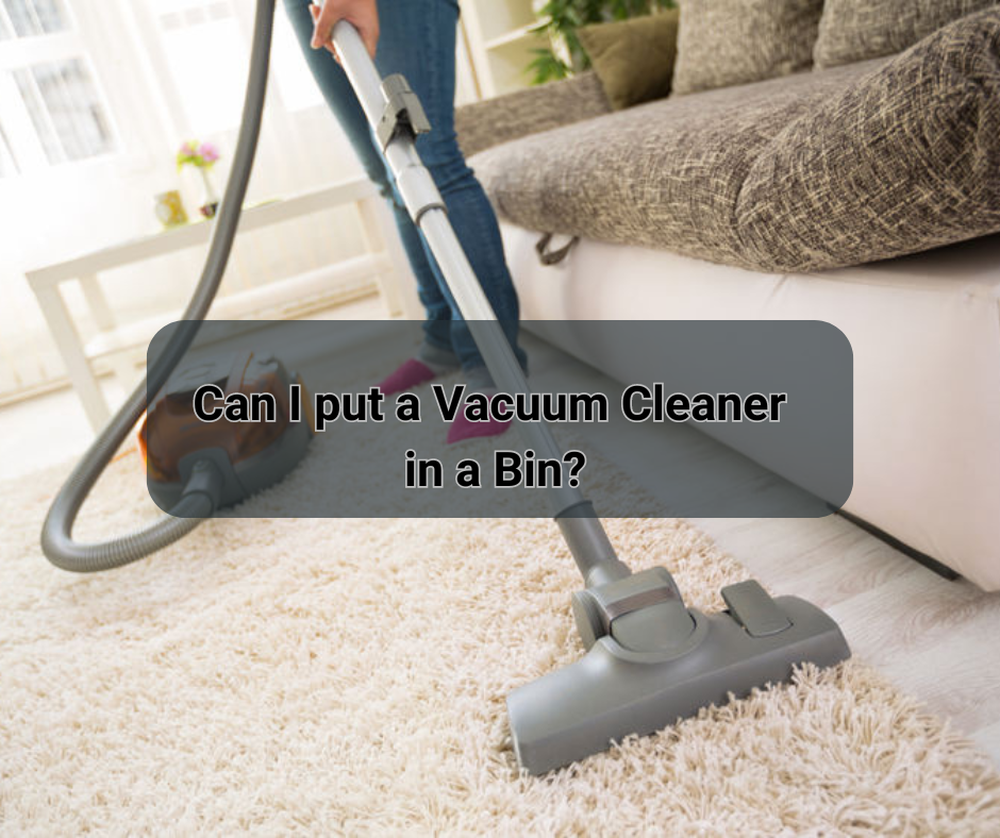How to Dispose of a Vacuum Cleaner?

Disposing of an old vacuum cleaner might seem straightforward, but it's essential to handle it correctly to avoid environmental harm and adhere to local regulations. If you're wondering, "Can I put a vacuum cleaner in the bin?" this guide provides a comprehensive answer.
Understanding Vacuum Cleaner Disposal
Vacuum cleaners contain various materials, including plastics, metals, and electronic components. These materials need proper disposal to prevent environmental contamination and facilitate recycling. Tossing a vacuum cleaner in the regular household bin is generally not the appropriate method for disposal.
Why You Shouldn't Throw Your Vacuum Cleaner in the Bin
Environmental Impact: Vacuum cleaners often contain hazardous materials, such as electronic waste (e-waste), that can leach toxins into the soil and water if not disposed of properly.
Recyclable Components: Many parts of a vacuum cleaner, including metals and plastics, can be recycled. Proper recycling helps conserve resources and reduce landfill waste.
Legal Regulations: In many areas, local laws and regulations prohibit the disposal of electronic devices, including vacuum cleaners, in regular trash bins. Non-compliance can lead to fines and other penalties.
Proper Ways to Dispose of a Vacuum Cleaner
1. Manufacturer Take-Back Programs
Many vacuum cleaner manufacturers offer take-back programs where you can return your old vacuum for proper recycling. Check with the manufacturer for any available programs or incentives.
2. Electronic Waste Recycling Centres
Local e-waste recycling centres are equipped to handle the disposal of electronic devices, including vacuum cleaners. These centres ensure that hazardous materials are processed safely and recyclable components are recovered.
3. Municipal Waste Disposal Services
Some municipalities offer special collection services for electronic waste. Contact your local waste management authority to learn about scheduled e-waste collection days or designated drop-off locations.
4. Retailer Recycling Programs
Many retailers that sell vacuum cleaners also provide recycling services. When purchasing a new vacuum, inquire about any recycling programs for your old one. Some retailers may even offer discounts or incentives for recycling.
5. Donation and Reuse
If your vacuum cleaner is still in working condition, consider donating it to a local charity, thrift store, or community centres. This option extends the life of the appliance and benefits others.
6. Disassembling for Parts
For those who are technically inclined, disassembling the vacuum cleaner and separating recyclable materials is an option. Ensure you handle and dispose of any hazardous components properly.
Steps to Take Before Disposal
Before disposing of your vacuum cleaner, follow these steps to ensure safe and efficient disposal:
Unplug the Appliance: Ensure the vacuum cleaner is unplugged and free from any electrical sources.
Remove Dust and Debris: Empty the dust bag or canister to prevent additional waste and mess during disposal.
Detach Removable Parts: Separate any removable parts, such as hoses, brushes, and attachments, to facilitate recycling.
Consult Local Guidelines: Check your local regulations and guidelines to confirm the correct disposal method and any requirements.
Can a Vacuum Cleaner be put in a Hired Skip?
Disposing of a vacuum cleaner in a hired skip is not recommended. Vacuum cleaners fall under electronic waste (e-waste) due to their electronic components and potentially hazardous materials. Most regions have strict regulations prohibiting e-waste from being placed in regular skips. Instead, consider alternative disposal methods as suggested above. Proper disposal ensures environmental protection, regulatory compliance, and resource conservation. Avoid putting vacuum cleaners in hired skips to support responsible waste management practices. Many skip companies will charge you extra if you do put a vacuum cleaner in their skip.
Conclusion
Proper disposal of a vacuum cleaner is crucial for environmental protection and compliance with local laws. While you should not put a vacuum cleaner in the regular bin, there are multiple responsible disposal methods available. From recycling programs and e-waste centres to donation and manufacturer take-back schemes, choose the option that best suits your needs and contributes to sustainable waste management.
By following these guidelines, you can ensure that your old vacuum cleaner is disposed of in an eco-friendly and lawful manner, helping to protect the environment and conserve valuable resources.
Author: Spencer Murphy
4 July 2024
Still have questions?
You can send us message, call or chat live with an expert for personalised advice.